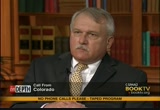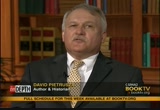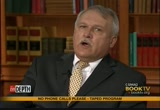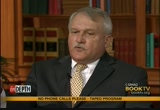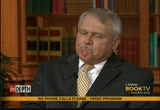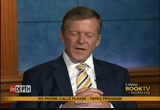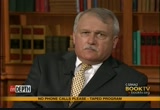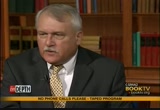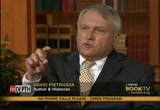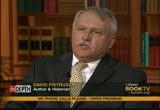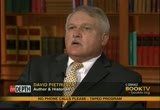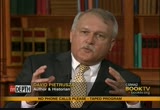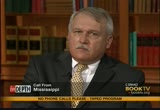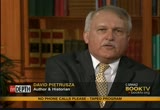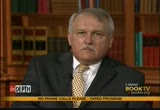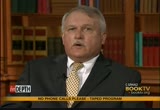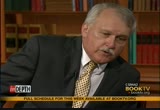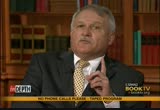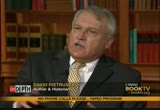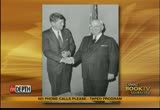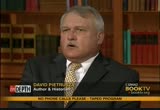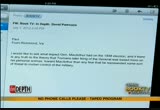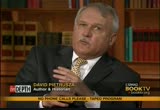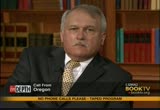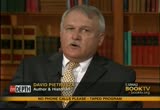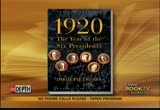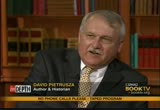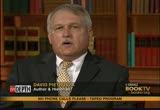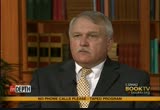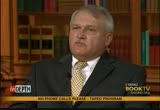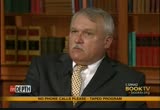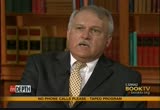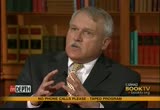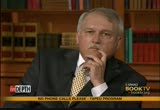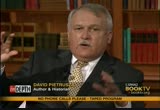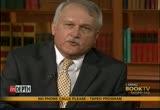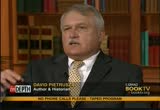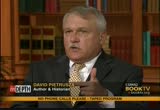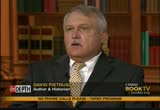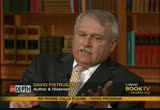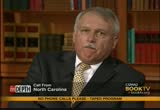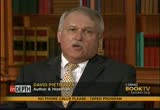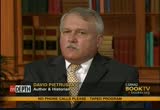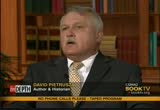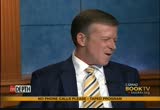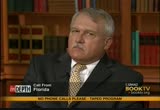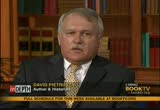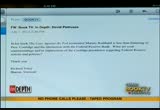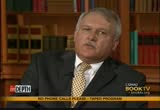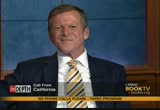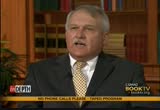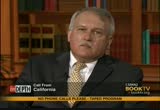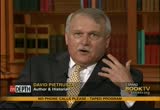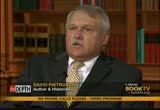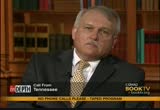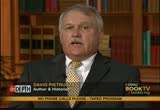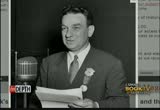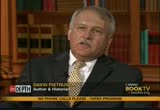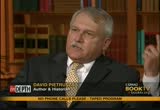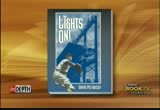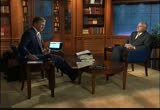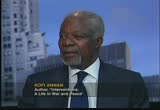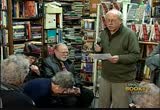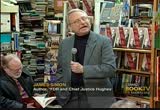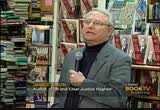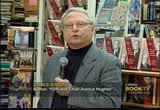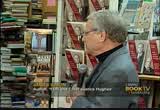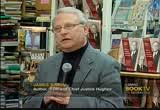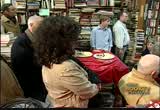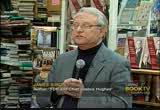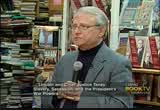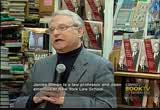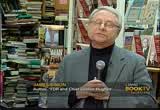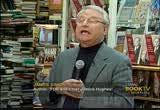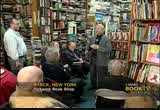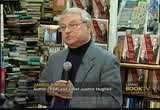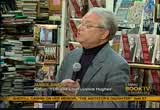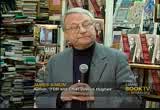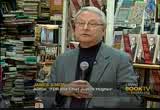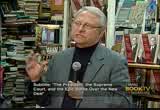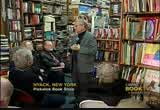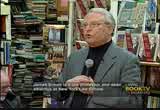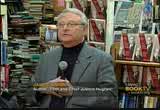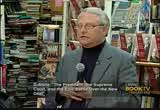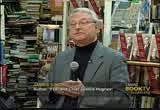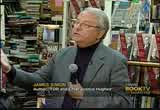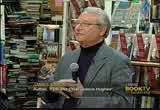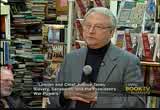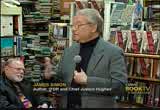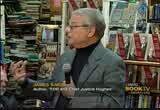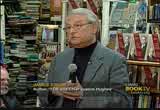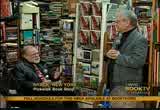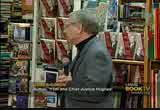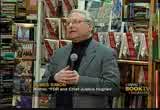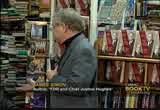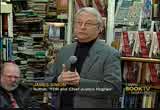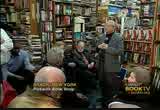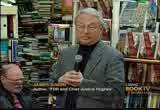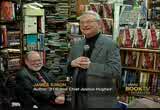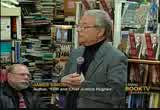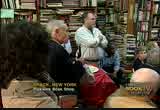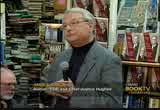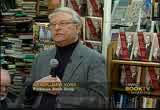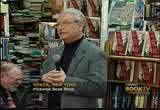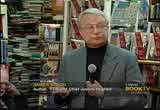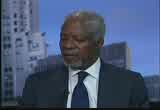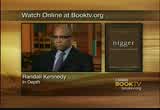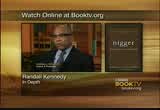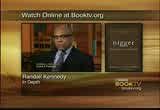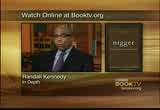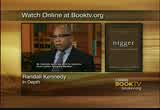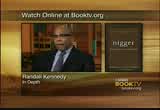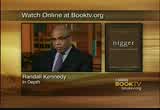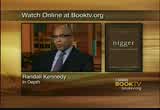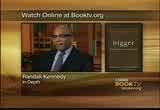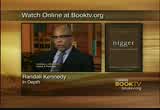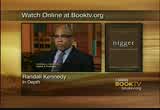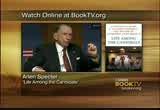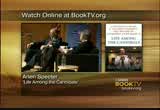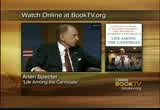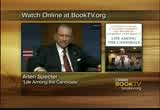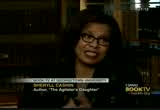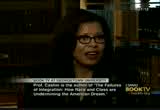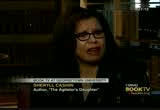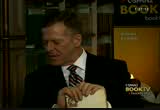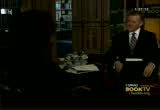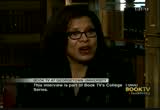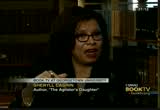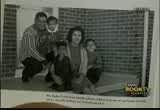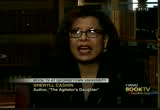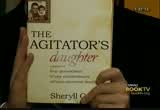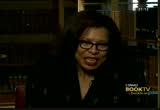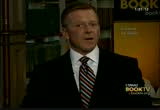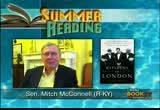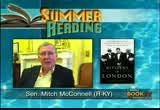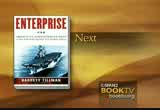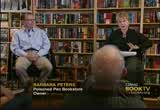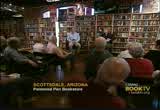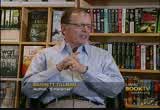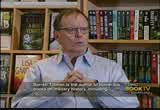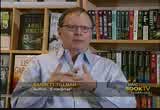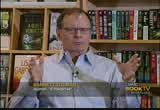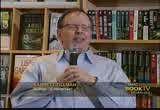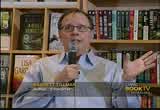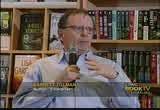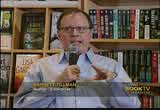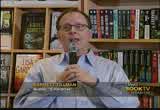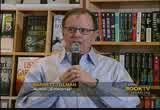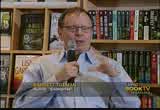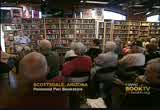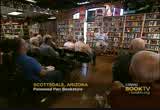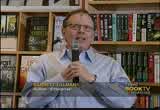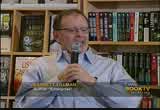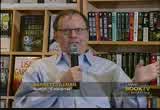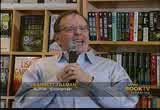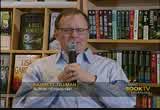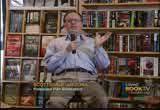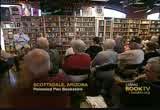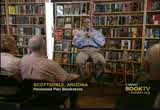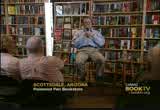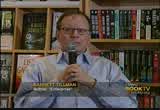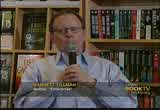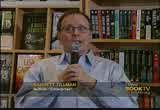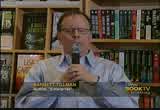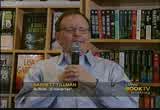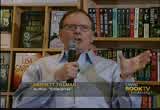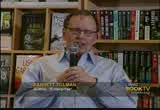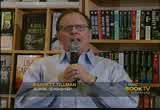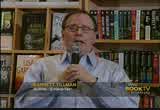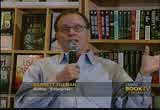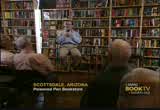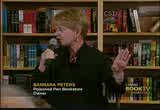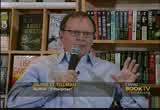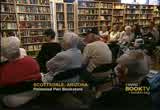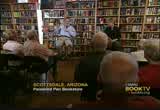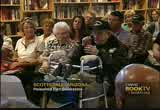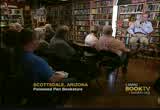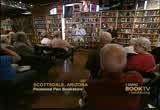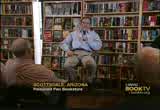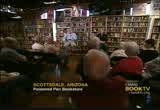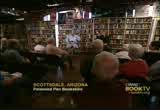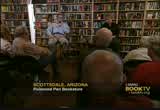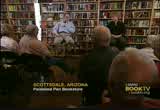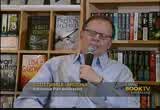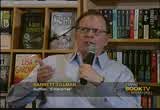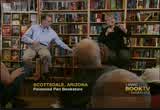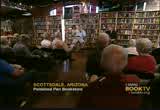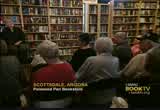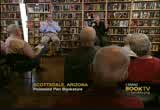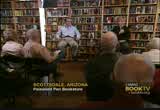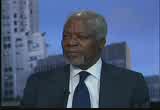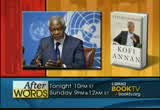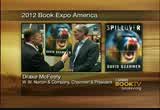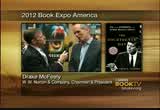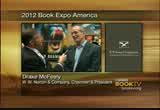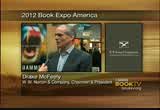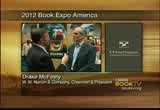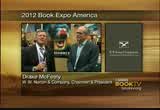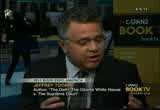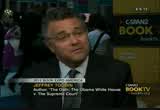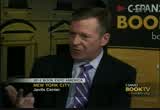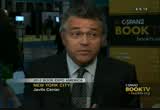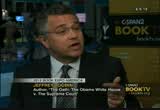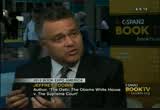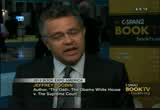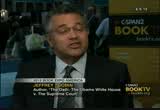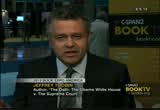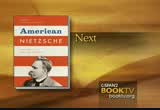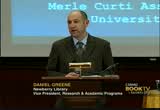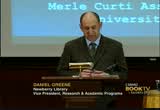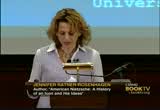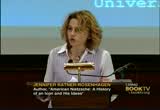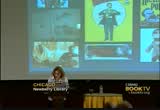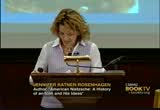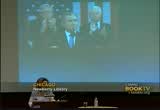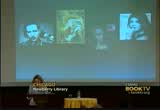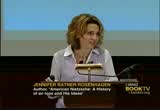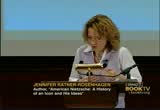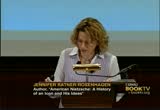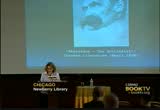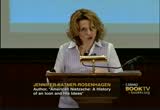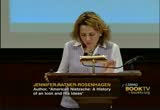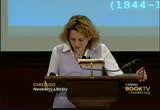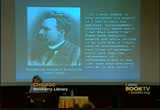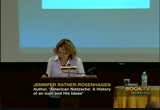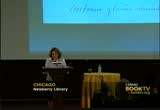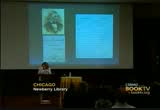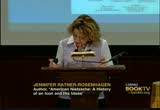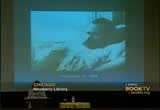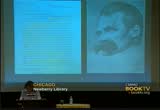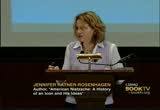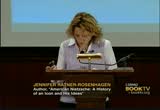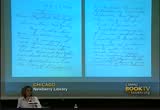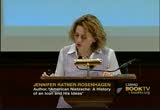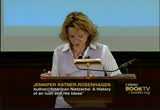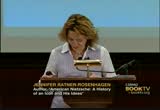tv Today in Washington CSPAN September 8, 2012 2:00am-6:00am EDT
2:00 am
companies and that scandal? >> guest: yeah. >> caller: and i'll hang up and listen to you, thank you. >> guest: well, teapot dome is, basically, the handy work of the secretary of the interior, albert w. fall. he controls the secretary of the navy. we talk about the strategic petroleum oil reserves, and this is what this is about. it's private oil companies tapping these. so the navy had them, and albert b. fall, you know, run into the secretary of the navy and says, hey, i need these. and it's like, okay. he doesn't know what he's doing. he's not a crook, but he doesn't know what he's doing. fall turns these over at bargain basement rates to a couple of oil companies. they're in wyoming, they're in california, and he is given -- they track it down, basically, from a herd of cattle. there's a herd of cattle which
2:01 am
mysteriously appears at his ranch from new jersey. and also there are denials. it's a very complex story, lies, and the money is laundered to, i think, the publisher of one of the washington papers, i think "the washington post," actually. so it unravels. this is -- it's difficult to know what harding knew about this, whether he knew this was one of the scandals that was a problem and which weighed his mind down and caused him to die. this all gets dumped in coolidge's lap. he had nothing to do with it, when he becomes president. and one of the things he does is, basically, simply get out of the way and let the justice system take its course. not -- on this issue and also on the issue of the investigation of attorney general doherty. the congress wants papers from the attorney general. does this sound familiar? and coolidge, who is very wary
2:02 am
of upsetting what he had inherited from harding before he took office in his own right, watches this go on for a while and then finally in march 1924 says, look, they're asking for papers, you're not an honest broker in turning these things over. your focus of this -- if you're not going to cooperate, i must respectfully ask for your resignation. and he gets it. >> host: in the 2012 election, are you seeing any similarities to past elections? >> guest: oh, there always are, and there's always differences. in regard to baseball, i would always say in regards to all things being equal, all things are never equal. but some of them do remind you, and certainly in 2012 you think a lot about 1948 because you think of the congress flipping so much in 1946 as it did in
2:03 am
2010. you think of a president who starts out, you know, truman started out at 87% approval rating. we won the war, right after that dropped the bomb, things were okay. and then it goes down. and dewey and romney have a certain similarity of, oh, background in terms of being eastern governors and blandness, quite frankly. >> host: um, this tweet has come in, peter wesley. mr. pietrusza, was coolidge a vain man? he was the only president of the united states to have his face on a u.s. coin during his presidency. >> guest: that is a true fact. that he is the only living president. it was a sesquicentennial of, you know, it was one of those things that, you know, washington and coolidge on the same thing. i'm not quite sure what role he
2:04 am
had in picking that out. he did say it is a good thing for our presidents to know they are not great men or for people to know that. and i think he had a understanding of his limitations, certainly the limitations of power, federal power, presidential power, but also, you know, when he went out to the badlands and he'd put a head dress on he put a big cowboy outfit on. and, you know, one of his advisers said, mr. president, people are laughing at you. and he said, well, sometimes it's good for people to laugh. now, a guy who says that can't be all stuck up on himself. of course, he was also decided he wasn't going to run for another term. so being on the way out of office sometimes is a good thing. gls and if you would like to e-mail or tweet to our booktv program with david pietrusza,
2:05 am
e-mail booktv@cspan.org and our twitter handle is @booktv. worcester, massachusetts. manning, you're on the air. >> caller: yes, sir. >> host: we're listening. >> caller: i, having been born in the middle '20s, the '48 election was the first one that i was able to vote in. and when it came to the polls, i was, obviously, very aware of what "the chicago tribune" had done and came up with dewey having won. but there was also the literary digest, and their poll also came up with dewey. but the problem they had was the sample that they had actually worked on was one of making telephone calls. and many people did not have telephones and, therefore, they got a sample that was not exactly the kind of sample that one needs. and after that election the
2:06 am
literary digest just folded up and never existed again. >> guest: well, that leads into how polls are being done today and whether you're calling people at home, you know, all the young folks don't have land lines, they have cell phones, and are we going to be measuring opinion that way? also, are we going to be measuring, you know, people on the street, people just living and breathing, walking around? are they registered voters? are they likely voters? all those are -- what is the nature of the sample? is it balancessed republican/democrat at the right point in time? but the main thing about your question is right pew, wrong church. and the lit prayer digest was -- literary digest was no t the '48 election, it was the 1936 election, roosevelt v. landon. what you said was absolutely true, they were polling by telephone, they were spectacularly wrong, and they were well out of business by the 1948. >> host: what were the final polls in 1960 saying?
2:07 am
>> guest: oh. that's where the people pretty much get it right. except for the private pollers in wisconsin get it wrong. and what causes him to campaign in the wrong areas and throw the results off is that they -- nail biter, all the way through. all the way through, all the way through is the neck and neck from start to finish. >> host: you quote charles kuralt in your book, "1960." i have believed that the outcome of that election might have been different had nixon been able to put his feet up at the end of the day and relax with reporters, explaining his positions over a glass of scotch and a cigar. but he was not the drinking, smoking, explaining sort or the relaxing sort either. i think it cost him the presidency in 1960. >> guest: when you have an election that close, any factor can be put into that slot. you know, the black vote, the southern vote, the -- whether he goes to too many states or not
2:08 am
enough states, if he's tired in that first debate. but, yeah, i mean, certainly his relationship with the press, i mean, nixon himself might have agreed with that. because he sort of agreed with it in not so many words, but in different words which were you won't have richard nixon to kick around anymore. >> host: needleland, texas. hi, robert. >> caller: hi. is it true that a mobster once said of truman, we bought him, but he didn't stay bought? >> guest: no. that doesn't sound familiar to he be at all. but -- no, doesn't sound familiar. >> host: well, what about his kansas city, for those who don't know kansas city -- >> guest: oh, now, there, there you're getting into the neighborhood though. and there were mobsters involve inside kansas city. involved in kansas city. he starts out as a small town farmer. you know, haberdasher ri and all this. the machine, tom pender gas
2:09 am
machine, puts him up for office in 1922. he's elected from the rural areas. he's from the farm areas, lifelong democratic family involved in the masons, involved in the fraternal organizations, in the veterans' organizations. all the boys go over as a bunch out to the trenches in world war i. but this is a, he's running the county after a while as the head of the county legislature, government. but he's taking orders from the boss, and they are skimming off millions. and this is something which he's, he's wrestling with. am i doing the right thing? i let them take this, i didn't want take it for myself. am i an honest man, or am i a crook? he writes this down himself. he's wrestling with his conscious. and gangsters in before he wins for the senate in 1932 there's a big rubout in union station in
2:10 am
kansas city of the machine-related gangster, johnny lanza, i think his name is. >> host: joe beatty from los angeles e-mails in to you, mr. pietrusza: why do you like louise brooks? in addition, what are your favorite historical movies? you listed louise -- >> guest: yeah. it was a favorite book. and that was because of the style of her writing and also it's such a surprise. it's such a surprise because here's this, basically, failed actress, and her book which is very n a way, very similar or her story to pat jordan's "a false spring" which is about baseball and a young guy who really has all the chances in the world given to him. and through sheer jerkiness runs themself out of a job. or maybe not a good curveball in his case, but louise brooks was
2:11 am
beautiful and makes a lot of mistakes. and it's a tragedy. you know, the frank sinatra song, "i did it my way," she did it her way. it lasted for a while because she was young and beautiful but did not serve her well in the long run. but in the long run, sometimes there are second acts in life. maybe you are a roy hobbs in many different ways. and by god, in her old age out of no training whatsoever, boy, she could write a sentence. >> host: rich lives in leland, mississippi, and, rich, you're on booktv on c-span2 with david produce shah. go ahead. >> caller: i'm here. >> host: yep. >> caller: i'm right outside of greenville, mississippi, where a lot of authors are from, but i'm originally from wisconsin, and i remember the election in 1960
2:12 am
although i was very young. but what i'm -- i was over in the library studying in a book about fascism. and most americans really don't understand what a fascist really is, i think. and after i read that book, i, you know, i think a lot of republicans -- maybe all of them -- are really fascists. and i know that's a radical statement, but i'd like your comment on that. >> guest: fascism is, well, fascism -- jonah goldberg has some really interesting thoughts on what constitutes fascism. and fascism is, is something which aside from authoritarianism is a cult of action, of really -- so temperamentally it's almost like a youth thing. kind of like occupy wall street where they don't even know what
2:13 am
the goals are, but we're going to act, we're going to act now. temperamentally, let alone ideologically, the republican party really doesn't fit into that mold. henderson, nevada. hi, ernie. >> caller: hi. i've been reading a book by a william luten berg about franklin delano roosevelt and the new deal? >> guest: yes, right. >> caller: and i'm struck by the parallels in particular around the second hyundais and up through -- hundred days and up through 1935 where the supreme court was making 5-4 decisions, and it included a justice named roberts. owen roberts. >> guest: owen roberts, yes. >> caller: yes. and how there's precedent really where these 5-4 decisions were made at a time when our nation was going through very similar patterns that we're now experiencing.
2:14 am
and i just wonder if you could comment on that. >> guest: the supreme court -- you know, that's the big supreme court fight, the court-packing fight of, like, 1937 after roosevelt wins the big land slideslide so misprotected by literary digest. and he decided he's not going to deal with this court anymore. and they say, there was an old saying that the court decisions follow the election returns. so that to, again, protect the integrity of the court you start seeing key votes on the court, start to flip so that they allow new deal programs which they had previously been knocking out like the nra, national recovery administration. and then you see retirements. you see retirements where roosevelt doesn't get to pack the court by dint or inflation of numbers, but simply by making
2:15 am
new appointments. >> host: david pietrusza, do you write full time? >> guest: yes. >> host: any teaching? >> guest: no, no. every so often i'll give a talk or something like that, but no teaching. i tried to -- my original goal was to teach, and the guidance counselor kind of called me in, and i was thinking about the doctorate. and it was, like, and where do you propose to work after this? which was a mind-chilling statement. so we took the day job after that. ..
2:16 am
>> you know what avenues you will be pursuing. then there are months and months and months of sheer research grade at the end of that, at some point you say i have not written a darn word. what have i been doing? that you have been building some 27 foot-high platform of granite foundation from which to work. and then it becomes come at some point, it all flows. in terms of archives and such, there is no fixed method of where you go. it is where it takes you and things. after a while, the material takes you. so much is now available,
2:17 am
electronically, it has really changed the game. it has also given you too much information. again you know that you have to start cutting sit down. >> host: for any viewers that were not listening earlier, what is your next book? >> guest: i am working on coolidge, a documentary history. which is coming around the bend. beyond that come in terms of the next historical or electrical history, not as a beginner. >> host: bolivian electoral history or presidential history. >> guest: it may or may not be. and another thing, which i have up there come is actually it is out there being shot, i have also written a novel. we are going off at about, literally, three directions at once. >> host: a historical novel?
2:18 am
>> not apolitical. it started off as something from a sports background. this is something that has been percolating about. it is kind of like a shawshank redemption with sports. >> host: please go ahead for your comment or question for other david pietrusza. >> caller: i would like to ask about the election in 1960, do you think that jfk's health problems would have prevented him from running in 1964? thank you. >> guest: i don't know that kennedy gets a kind that kind of shot -- i think that lyndon johnson is the senate majority
2:19 am
leader. now, let's give it to the man. and i don't think he gets it. i don't think it is so much a question of his health problems, although, his dabble in drugs ,-com,-com ma it could have caused some deterioration. he had a shot, he blew it. one of the things about the election is that the country was still in the new deal. a new deal country. he darn near dozen. kennedy should've won by more about the money didn't come in when he didn't, the party i don't think we'll give him a chance because they had just come and that was stevenson. that hadn't worked and 56. >> host: was there eisenhower 50 in 1956. >> guest: yes, i think there
2:20 am
was. not of eisenhower personally, he probably could have had a third term. i think he was so popular. and that is one of those unintended consequences. republicans passing a constitutional amendment to keep fdr from being president again. and they keep eisenhower for being president. there is the get america moving thing. the excitement is gone. they said yeah, right, it is as phony as possible. we were in fact doing very well. that we have the feeling that we should have been doing more, and jack kennedy conveyed that very well. >> host: paul in richmond, virginia e-mailed me, and he would like to ask what general macarthur had on the 48 election, and if there is any truth to the theory that trumans later firing of the general was
2:21 am
based more on his personal animosity towards macarthur, but many fear he represented some sort of threat to civilian control. >> guest: macarthur is, there are four candidates on the gop side. basically. when macarthur's campaign collapses, he has always been controversial, from the 1932 burning of the marchers out there, even as a soldier, some people didn't like the style, other people did -- it is tough to run when you are ruling japan
2:22 am
across the ocean, and also any heavy very advanced age, your 73 years old coming your getting used older candidates now. back then, life expectancy was less. truman could be very prickly, so personal animosity could have played a role in that. how much, i would hesitate to say. >> host: next call to david pietrusza comes from portland, oregon. >> caller: hello, how are you. my question is, i really don't think it is an indisputable fact, but over the years, we have seen come and the republicans have very openly thought about the deification of reagan. my naming some airports after him, so many buildings after him, i don't think reagan was a horrible man, but they had put him on a pedestal.
2:23 am
witness how many times he was referred to by so many candidates running. my question to the author is is there any historical precedents for a party or movement after the death of a president? going back, and in a sense, even rewriting history of his presidency when necessary. to create this almost godlike figure in their eyes. >> guest: i think it happens all the time. it wouldn't have happened to washington the federalist, it will look at that 1948 convention look at some of the things that have happened or if you have a jefferson jackson day dinner. they are still out there waiting the flag for jefferson hundred a hundred and some years later. lincoln is just so popular after the civil war, and to this day,
2:24 am
teddy roosevelt, yes very big. woodrow wilson, one of those big popular leaders at the time rated haile by historians, dominating figures, kind of misses that because things are just so controversial within the number of issues. franklin roosevelt falls into that category. and certainly jack kennedy in philadelphia, all the way to the museum. jfk boulevard's all over the place. >> host: david pietrusza, in your book "1920: the year of the six presidents", how did woodrow wilson find out about theodore roosevelt's death in what was his reaction? >> he had gone to europe to negotiate the peace treaty
2:25 am
firsthand. and before it all starts come he kind of makes the grand tour in france, italy and it is still wildly popular. he is the savior of the world. and he hears about it in italy. and he is just happy about it. he is really truly happy about it. which shows something about his character. he was not a big man about these things. so many of the interpersonal relationships, he turns on people that were then allies. >> host: from louisiana, we have chance. please go ahead with your question or comment. >> guest: i would like to know if you have an opinion of the process that we use now to get presidential candidates, compared to 40 or 45 years ago because so many people nowadays that i have spoken to, feel like we have never had anyone to vote for, only to vote against someone in the party.
2:26 am
>> guest: i think we have about a long history of voting against somebody or another. but yeah, it is a different process, it is a different process as we touched on before but there are so many primaries in so many primaries translating into so much money to spend. also, it translates into these guys is getting exhausted. you took a look at romney or even gingrich if you end of that process. and they just look completely winded i had the pleasure of conducted in a series of interviews to explain this process to them. what we take for granted is so foreign to them that the next
2:27 am
president of the united states is forced to go to some little general store in new hampshire. the fact that it is so fragmented, 16 votes here, 47 roads here, this convention, it is a great mishmash, but it is also a reflection of our whole federal system. which is that diffusion of power. house, senate, congress, states, courts, that is kind of how the thing is set up. if you want to go to something else, you're going to end up going a lot to back rooms. a vestige of the back rooms is these so-called superdelegates. >> host: in 2007, david pietrusza published "1920: the year of the six presidents." again, who are the six presidents involved in that election? >> guest: in order of them holding office, theodore roosevelt, woodrow wilson,
2:28 am
warren harding, calvin coolidge, herbert hoover, and think when eleanor roosevelt. >> host: hour each of them involved? >> guest: tr dies in his sleep, january 1919. warren harding is a senator from ohio, newspaper editor. kind of a state republican, wins the nomination of the course. kevin coolidge, calvin coolidge, a favorite son candidate. the 1920 convention stampede. nixon vice president. he becomes president when harding dies. i skipped over woodrow wilson, deny? woodrow wilson, president of the united states, and invalid. think you can stampede the convention in san francisco since his secretary of state could do that. kaj:
2:29 am
>> host: so we didn't stand a chance. >> guest: some basic functions, something together. herbert hoover was a great engineer, secretary of commerce. he is elected and 28. think when roosevelt, democrat. secretary of state. i'm sorry, secretary of the navy under wilson. vice presidential candidate that year. >> host: when did the convention stop mattering, or do they matter? >> guest: boy, you know, we have common -- you know, they do matter but -- four years ago, you know, it was almost down to the wire. it was hillary. they were counting the vote after vote. in 1976, reagan and ford, there was still that backroom thing going on.
2:30 am
i could tell you some personal tales. pressure being put on people on what i knew, and who ended up saying, oh, have to visit my stepdaughter in south carolina. >> host: greg from massachusetts. go ahead. >> caller: you flash a picture and it looked like his two sons. i perused some old newspapers and i came across a count of the death of his son. you know, i would like you to comment on that incident and how it impacted his presidency. if it did, and i will listen. >> guest: we are coming up on the anniversary. the older son was john coolidge, who actually knew a little bit, interviewed him at his home in plymouth notch. the younger son was calvin,
2:31 am
junior. they are playing tennis on the white house tennis court. maybe exactly july 1 or july 2. right around this time frame, a blister develops on calvin's foot. it rapidly becomes an infection. they bring doctors down from philadelphia it is a horrifying event. there is like a glass -- a glass bowl, blowing up, intravenously is this child is dying. and the glasses falling into calvin coolidge's face. and coolidge is dam near hysterical. he is hysterical at the death of his son. it was terrible. coolidge was suffering from depression after this.
2:32 am
it affected him. coolidge said the joy when out of the presidency after that, as well it should. every time i look out that window and see that tennis court, i see my boy out there. so it was a terrible thing. but also, coolidge, he does what he wishes to do on his agenda. and he is a lame duck for a remarkable period of time. he is not running, he announces, the time he leaves office. >> host: david pietrusza is an author and historian. he is our guest this month on book tv is "in depth" program. bob from laguna woods, california, you are on the air. >> caller: hello, how are you doing? david, you might want to modify your response on the previous comment, that he made on republican party and fascism.
2:33 am
the original modern-day fascists say that fascism should be called corporatism. the merger of a corporation and government power. and that was set by the infamous bonito mussolini. in the 1920s. the republican party, i think, today, they are a corporate power and government power. together. any comment? >> guest: we see corporations from both sides, working both sides of the aisle, as well as they well. if not to further their own interests directly to keep government from coming down on them, and what we have seen
2:34 am
recent administrations have come under the obama administration with the bailout of certain industries, the takeouts certain industries, not necessarily socializing something, but becoming partners with gm or chrysler or with the health care situation. were you could point to certain things with the pharmaceuticals, the pharmaceutical industry was in favor of certain things about certain other things require no co-pays or require that generics shall not be used. this tends to favor the industry. you have partnerships come you have partnerships with ethanol and that or whatever. and so he you can point the finger to a bunch of parties. i think that the pure forms of the republican party are pure conservatism, and they have a tendency to stay away from that. >> host: david pietrusza, in the 1920 election, was the corporate
2:35 am
interest of randolph hearst involved? >> guest: they are such dabblers in politics. william hearst is a radical figure, a radical democrat. he then becomes quite conservator later in his career than supportive of coolidge. >> host: why is that? >> guest: i'm not quite sure. i think that people, as they get older i'm a change their opinions and move from left to right. in 1920 he is still a democrat and a 1932, he is still a democrat. it is at the urging that kennedy's father, joe, who
2:36 am
helped roosevelt to get the nomination. henry ford is again a democrat. he ran for the united states senator -- china, got cheated out of his seat, but he had been a good advocate during world war i, and was the premier guy in the country publishing the dearborn independent. in the elders of zion, and the international jew. >> host: did he tend to support third-party candidates or supportive of the democratic ticket? >> guest: he would not go off on his own. he would not go off on his own. i think he was a democrat. it had something to do the republicans in the new deal. there was a poll in 1922 or 23. the choice of the american people -- number one was henry ford. this was after all the anti-somatic stat. ann harding was well below that.
2:37 am
besides knowing that they were coming and the republicans had taken a big state in the midterms. >> host: what was the effect of the socialist party in the 1920s. >> guest: they can drive five, six, seven, eight, 9% of the vote. for long periods of time they tended to do better in bloggers. when it's going to be a blowout, doesn't matter who you vote for. once closer, they said oh,
2:38 am
dispensing guy -- he's in jail, he's an influence come he gets 900,000 votes that year. there is a remarkable total. woodrow wilson basically, his administration put him in jail, again, don't look necessarily for the straight, left right line 100 years ago or 80 years ago. a democrat wilson puts them in jail, ended its harding, who is a very kindly man. that is one thing everyone would say about them. personally, really nice guy. but he he gets out of jail, and he says i think your get out of jail for christmas. he says this about the stuff by the white house and i want to say hello to you when you get out of jail. >> host: did he have, harding, did he have good relations with the congress? >> guest: no, actually, because the senate is so fractured between progressive and what you call conservative wings of the
2:39 am
congress and particularly the senate, which he did come out of it. you have [inaudible name] and george morris, there is a big midwestern populist wing. and they are just, they are wildly in there -- just going third-party 1924. >> host: next call for david pietrusza comes from jan in wilmington, north carolina. you are on the air. >> caller: thank you very much for having me on. i have a two-part question. the first is you are talking about archives. what is the future for historians now that everyone is on the computer and all paperwork in on phones where you can get your hands on a lot of it. the second part is how do they that the candidates versus the way they don't vet or do that now with television and radio.
2:40 am
questions to ask and not ask. has it changed and how did they choose the candidate for president. >> guest: i think opening up things, it's great. it's great for people. the person can do it on their own. it is good to have these things not quite filtered. is it all laid out in a neat package with a ribbon on it? oh, it is not. and it never will be. you have to go through, and maybe more so there is, you go through more and more and more and you have more and you have the vet, you have to get that information, which is question number two. which is how do they vet that. just as they vet now, it is often a hit and miss process with warren harding. the story goes that george harvey who is putting together a
2:41 am
group of senators -- there's a harding, it's you, we're going to you, and is there anything in your background that would keep you from being president? harding is like, -- and it takes 10 minutes to to answer. that should have been their first cause for alarm because there were all those women in trouble, but there were those. nothing of personal corruption. there were those. that nonfarm harding during his presidency. >> host: this e-mail from michael. do you think charles evans hughes would've made a good president? he was an amazingly capable individual. >> guest: he was a capable individual, i was on c-span talking about it. we will be on tonight on american history tv, they are re-airing that. >> host: that is right yes
2:42 am
mackey is amazingly capable as an individual. he might've been more liberal or progressive. under harding, even though he served under both the secretary of state, he was a fairly conservative chief justice of the supreme court. but not entirely. so you can't totally pigeonhole him. his revocation of governor -- reputation of governor of new york, he starts out by busting trusts or the insurance industry. >> host: how well did thomas do we know earl warren before the 1948 election, and why was earl warren concerned? >> guest: the question is how well did earl warren know tom dewey? and i -- i think he liked them a
2:43 am
lot. they had these governor conferences. they met them up so that they actually knew each other. and one of the dewey was a darn fool. just shut up and, oh, i don't like him. do we, however, look to this fellow, this progressive fellow, he is not like a reactionary like john brickner, who he does take in 1944. he is from california. he can bring both in. it was actually dewey in 1944, and duly turned them down. do he says -- one thinks that if he has any future in the party, that are not turned on again. maybe he was thinking of the supreme court, i'm not sure what he was thinking. but he takes it. they don't like each other. the campaigns don't match, and they don't meshed so much that either one or one swipe end up in a voting booth in november
2:44 am
november 1948 going down the lever for harry truman. >> host: there is a tweet for david pietrusza. i find it silly to limit presidents to two terms while congress is unfettered any chance to go back. >> guest: i don't think there is a chance, because there is not a huge constituency for it. maybe none. certainly no constituency among the senators who want to succeed, so i think that -- i don't think that's going to happen. plus it is very hard to amend the constitution and it seems to be getting harder and harder. >> host: next call to david pietrusza prig of about 15 minutes left in this month's "in depth" program. john, it port st. lucie, florida. >> caller: you mentioned you have some knowledge of the 1976 reagan convention where he lost against ford. was he the first to actually
2:45 am
have a vice presidential candidate -- and you happen to know who else in 1980, who else besides bush was considered for the vice presidency. i always felt that reagan's biggest mistake was bush, and i wish that he had picked someone else. >> guest: well, in 1976, i think there is a really crazy thing where people were picked, like around 1840 or two years before the election -- they would pick the vice presidency. in the modern era, writing picking of richard schweikert to peel off some of the votes from pennsylvania, which did not work was really the first i remember being at a meeting that day of folks, as that was announced. in the chagrin that burst forth.
2:46 am
it was not a real game changer. in terms of 1980 and picking bush, welcome if you aren't happy with bush, he would not have been happy with the fellow that was discussed at more length at that point, gerald ford. there was a discussion of quite a bit of a reagan and ford ticket. but ford was basically asking not to be vice president again. which is understandable. but to be copresident, maybe senior copresident, you can understand why ronald reagan would not be crazy about that. >> host: dave tweets in, have you read the wikipedia article on arnold rothstein? would you change anything? >> guest: i imagine at some point, but i can't think of anything offhand. my memory of it would be, minimal at this point.
2:47 am
>> host: richard from vermont e-mails into you. in his book, the case against the fed, economist murray rothbard is less than flattering of president coolidge and has interaction with the federal reserve bank. what are your understandings and or impressions of the coolidge presidency regarding federal reserve actions and policies? >> guest: rothstein is often not in favor of anyone. [laughter] [talking over each other] >> guest: there's a great divide between conservatives and libertarian. i do know that there was some issue as to whether reagan should have had a little more control over the federal reserve, and in that case,
2:48 am
rothbard. unless they had completely messed up, he would ask for them -- they would ask for their head. up until that point, he was kind enough to let them have their head. >> host: marine from san rafael, california, yuan with david pietrusza. >> caller: good morning for the day. my question is about the provenance baseball team in providence, rhode island. do you have any history could talk about as this version history of that team. 1898 through 1902, i know from postcards, there was not a lot from one of the players sent.
2:49 am
>> guest: why your personal interest in this? >> caller: i had a great uncle who was a player and he wrote my great aunt and he was from the providence braves. that is all i know about him. there is a picture of him in a baseball outfit. >> guest: back when i was president of american baseball research, never pretended to know everything about research. there is a rhode island chapter of the society for american baseball research. if you go online, find out how to contact them, and i'm sure they have something for you. >> host: did you grow up in canada? >> guest: no, no.
2:50 am
i did a history of baseball's canadian american league, and most of the teams were actually in new york state. >> host: what he think there is only one canadian team in the major leagues? >> guest: oh, you have a limited number of cities of a certain population of growth. montréal started off -- boy, if you ever go to a game at the olympic stadium, what a tomb. there is no air in it. there is no excitement. and then you go out to the concession stand and everyone would be standing there, watching the hockey game on tv. literally. >> host: sonoma, california. hello, carol. >> caller: thank you so much for this program. i grew up in san francisco. and i remember when jack kennedy
2:51 am
was running for president. the basis of all conversation was he will be the first catholic. i remember that. all the time. now that romney is in the running, i don't hear word about how he will be the first mormon. it seems to me that mormonism has many more factors of a cold than catholicism. i was wondering what you think about that. i don't hear one word about that. i will take your answer. >> guest: i think that is being discussed. i don't think it is -- i think these things are often not so much discussed in the open, and they are kind of discussed in whispers and maybe in shouts and certain quarters. the irony of kennedy being elected.
2:52 am
johnson vindicates the majority leader of the senate, that goes to mike mansfield. the speaker of the house dies from john mccormick to come speaker of the house and he is a catholic. then you have the president come speaker of the house, and the majority leader of the senate. all catholics, nobody notices. >> host: did martin luther king have a role in the 1960 election? >> guest: sure. >> host: how well-known of the figure was he at that point in time. >> guest: fairly reasonably well-known. and i think more than reasonably known in the black community, which is really where it counts in terms of the election story. he gets arrested on a traffic violation and he manages to attend this event, which violates his parole. they say that you're going to the prison camp, which is a real bad place. his wife gets all worried.
2:53 am
jack kennedy put in a call through coretta scott king, saying that we have to do something about this. and it becomes a factor in swaying the black vote and they put up millions of pieces of literature and a lot of radio advertising in the north that do that as well. >> host: the next call comes from memphis, tennessee. go ahead, rachel. >> caller: personal, i'm very nervous. second of all -- >> guest: you want to be your. >> caller: my favorite president is truman. i'm 54 years old now. truman had what i would say integrity. every aspect of it. which obama had. and i think that confuses people
2:54 am
today. you have a president that has absolute integrity, all of it, not just a portion of it -- every aspect of a? and i equate the way this campaign is going today as the campaign of 1948. romney is the dewey and he says nothing looks pretty like the man on the wedding cake. >> guest: the comparison of do we and romney, i think, is very apt. the question is also how is obama a truman figure. has he been through enough adversity before an election to pull this off. also, the circumstances with the country are very different here you have a .3 or 8.1 unemployment. you have two or 3% unemployment with truman.
2:55 am
you had an problem with inflation that year. you had a nation still at peace here, still trying to figure out everything -- you have massive differences, i think, in the election. dynamics. stay tuned. >> host: paul nor wine tweets in, do you think charlie halleck would've made it better vice president for dewey or eisenhower? was he stabbed in the back by dewey? first of all, who was charlie halleck. >> guest: he was the majority leader of the house of representatives. he was from indiana where he took the seat after the death of his younger brother.
2:56 am
that was one of the big humps. one delivered nothing. we are sort of standing come also the weakness of dewey's campaign in the midwest and halleck would've stood out somewhat more. >> host: at last call comes from canaan, new hampshire. >> caller: i have a question about the 1960 election. somewhat related to 1960 campaign come i would like to ask, do you know where i might have defined any photographs in west virginia? i think i might appear in actual pictures.
2:57 am
>> guest: usually the old newspaper files or historical society would work. to switch from parties, even if you are a billionaire, to take it over is very hard. they just don't want the newcomers coming in. i also think he was the original rockefeller republican. i don't think he could've made the switch, and i don't think it would have been a comfortable match. >> host: an e-mail from bob of illinois. he says good book written on the history of [inaudible] >> guest: i'm not sure. i know there are some books. i'm not sure which one would be the best. >> host: is the teapot dome a major scandal? guess oh, yes. the secretary goes to jail and he is the first one. it is a major scandal. and it also -- william gibbs mcadoo i talked about, he just
2:58 am
was implicated in an unfair way. that helps derail his chances in 1924. so it has implications for both parties. >> host: we have another e-mail that asked to comment on ross perot's legacy. >> guest: i'm not sure he has one. the ideology wasn't firmly fixed. he reformed the third party, which is still very influential. otherwise, i think not. i think not. but he did talk about things which we are still talking about. talking about deficits and trading balances and the loss of manufacturing. the giant sucking sound. based on him, i'm not sure. for the past three hours we have been talking with david pietrusza. here are his books. minor polls, minor league
2:59 am
baseball. it came out in 1995. lights on, the wild century long saga of baseball came out in 1997. judge and jury, the light of judge kennesaw. the light lifetime of rock scene who fixed the 1919 world series. 2003, major league. it came out in 2005. baseball's canadian american league. also came out that year. in 1920, his first book, i'm sorry -- 2007, the book is "1920: the year of the six presidents." "1960: lbj vs. jfk vs. nixon: the epic campaign that forged three presidencies" came out in 2008. in his most recent "1948: harry truman's improbable victory and the year that transformed america." he has cowrote a book on ted williams and he edited "silent cal's almanack." mr. david pietrusza, thank you for being on booktv. thank you for joining us.
3:46 am
>> harvard professor, randall kennedy nerd is selling book company and/or time of the strange career of a troublesome word. you write about violence by speech. what do you mean? >> guest: that book is about the word nigger and is a word that is triggered lots of violence and to some it is the final word in another cells. what i wanted to do in that book was to give a history of this word that has been covered with blood literally and sometimes figuratively and wanted to show the way in which this word has wrought havoc in american culture. of course that is not all it does. one of the reasons why it was both worthy is because of the complicated word. it has a terrible history, a history of insult, history of terrorism, a history of
3:47 am
3:48 am
i knew her for a good portion of my life. she used the whole -- a lot of different words. she referred to black people sometimes as colored people. but she also sometimes would use the infamous n-word, and she has been a person who's example and whose wisdom has been with me all my life. >> host: is it illegal to use the n-word? >> guest: generally speaking, no, although -- well, i take that back. if you use the n-word in an employment setting, for instance, if you or somebody supervisor and you refer to your work to a worker as a nigger,
3:49 am
where you refer to black people as niggers, you may be in violation of the law by creating a hostile workplace and thereby make yourself subject to a liability under state law or new the civil rights law of 1966 -- 1964. so, under certain circumstances, you can do things which would make yourself -- which subjects yourself to legal liability, or another way. if you commit violence and in the indication of a -- the commission of a violent act refer to people using the n-word, you might be subject to hate law legislation, and thereby not only be prosecuted for assault or whatever violent act you have committed, but you
3:50 am
might subject yourself to an enhanced penalty by running afoul of state hate laws. so, under certain circumstances, yeah, you would be in violation of the law. generally speaking, though, because of the strong shielding power of the first amendment, people, for instance, comedians or writers, can use the n-word and not have to fear the law, though you might have to fear a public opinion which itself can be a very powerful force. >> host: is that the near word versus citing word? >> host: the law of homicide, all sorts of different levels of homicide, and one big divide is between manslaughter and second
3:51 am
degree murder. so, for manslaughter, the law gives you a little -- if you kill someone, but you can make the argument that you killed somebody in you were in the grip of passion. the classic example of manslaughter, you come home and you find your girlfriend or your wife in the arms of another, and you kill that person. you've committed a violent act, but the law will give you a little bit of a break because you were in the grip of passion, and the law says, we give you something of an excuse. not a full excuse but we recognize that you couldn't control yourself. well, there's some people who have made the argument that they were in the grip of passion because somebody called them the infamous n-word. they strike the person, maybe they kill the person. and the argument becomes, can you or can your lawyer make the
3:52 am
arguement to a jury that you were in the grip of passion because this person called you this particular word. now, in some jurisdictions, like washington, dc, you cannot even make that argument. washington, dc, the jurisdiction that has the "just words" doctrine, and the law says no matter what the word, no matter what somebody calls you, that's no excuse for using violence. but other jurisdictions say, we'll let you make that argument to a jury. >> host: professor kennedy, you write in the n-word book, there's nothing necessarily wrong with a white person saying the n-word, just as there is nothing necessarily wrong with a black person saying it. what should matter is the context in which the word is spoken. the speaker's aims, effects, alternative, to condemn whites to use the n-word without regard to context is simply to make a
3:53 am
fettish of the word. >> guest: yes. the best example to illustrate that point is mark mark twain'st novel, huckleberry finn. anythinger appears in that book over 200 times. i think huckleberry finn is a wonderful novel and its impulse is antiracist. antislavery, obviously over the years there have been many people who wanted the book banned or wanted to erase the word. i'm not for that. you have a white author, but he is using the term "nigger" for purposes that are clearly antiracist purposes. there are others. lenny bruce. lenny bruce was a great social sat -- satirist. he had a number of times when he
3:54 am
used the word nigger, not to insult black people, but to turn the table on people who were antiblack in their feeling and he used the word nigger to laugh at them. using the word nigger as a mirror on race simple in order to combat racism. adore used the word anythinger in some of her short stories. she wasn't using it to be a racist. rather, she was using is as an artist to de-legitimate race simple. that's what i meant. obviously there are black people, too who have used the term nigger in ways that in my view, are completely unobjectionable.
3:55 am
dick gregory titled his first autobiography, "nigger "an autobiography." and richard pryor with two great albums, "that nigger is crazy" and bicentennial nigger." >> host: when you wrote the book, it was published in 2002. what reaction did you get? >> host: when i do. >> guest: when i wrote the book i got a lot of reaction, some positive and some negative. and continue to get some positive reactions and negative reactions. some people took real offense at the title. if there was one aspect of the book that probably got me the most negative reaction was people who complained about the title, and who thought that i
3:56 am
was being sensationalist, i was exploiting this term by putting it right there in the title, right there on the cover of a book that would appear in your book stores all across america. and what i said to people was -- and i still say -- and i say this unapologetically -- if you write a book you want people to read your book. there are thousands of books in any book store. there are hundreds of thousands of books in any big library, and you got a lot of competition. the first thing you want to do, if you're an author, is to at least have somebody pick up the book. and so when i was thinking of a title issue thousand what i can title this book that would get somebody to take a peek, read the first paragraph. and i thought, well, nigger.
3:57 am
250 Views
IN COLLECTIONS
CSPAN2 Television Archive
Television Archive  Television Archive News Search Service
Television Archive News Search Service 
Uploaded by TV Archive on

 Live Music Archive
Live Music Archive Librivox Free Audio
Librivox Free Audio Metropolitan Museum
Metropolitan Museum Cleveland Museum of Art
Cleveland Museum of Art Internet Arcade
Internet Arcade Console Living Room
Console Living Room Books to Borrow
Books to Borrow Open Library
Open Library TV News
TV News Understanding 9/11
Understanding 9/11